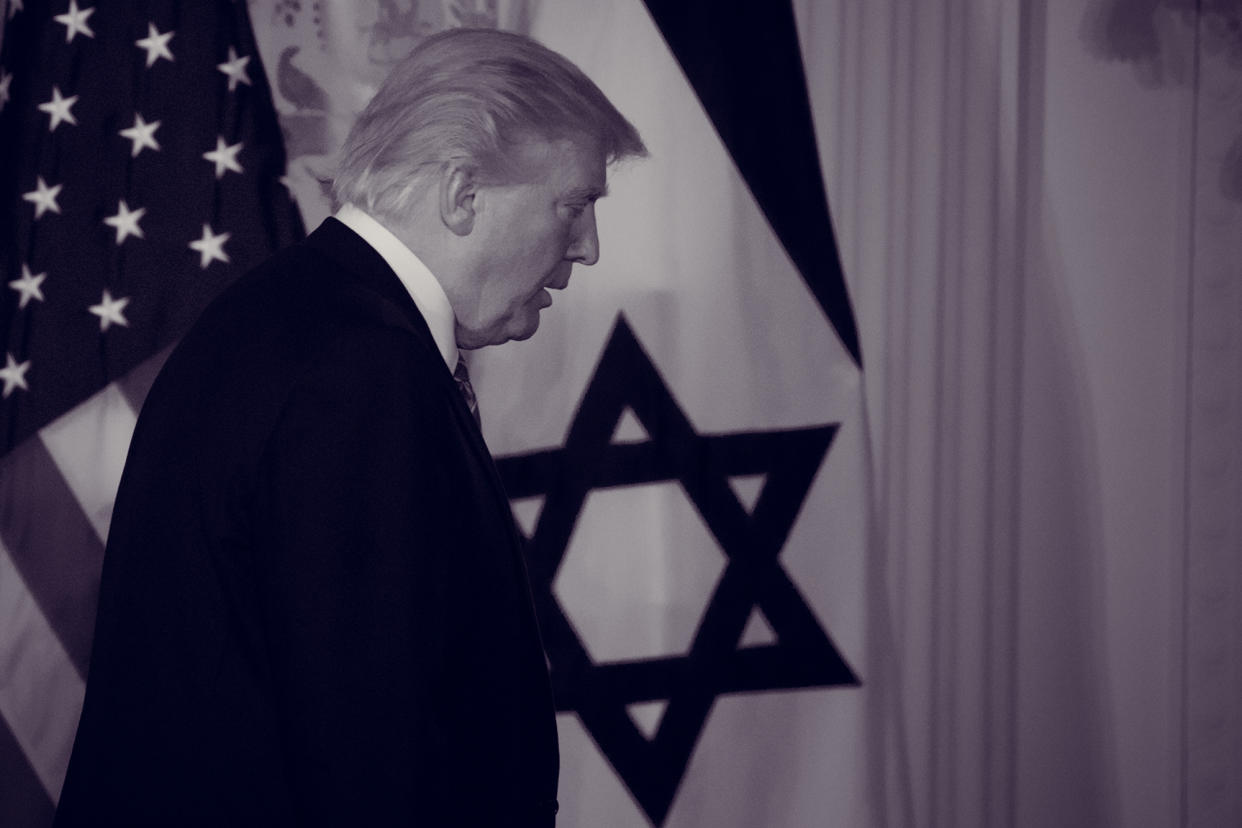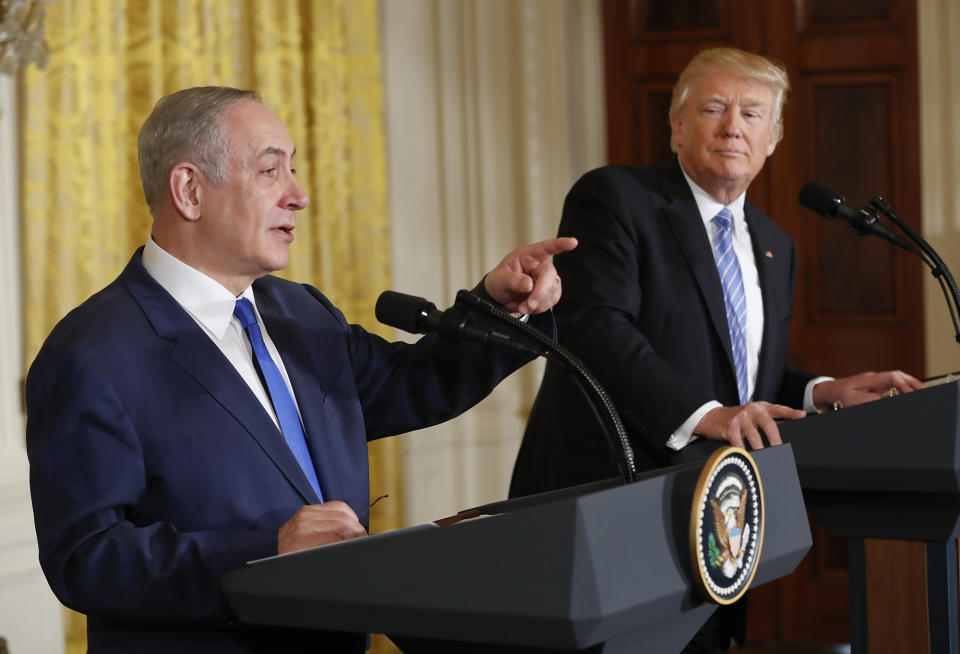Trump heads for Israel, and a wary welcome by the once adoring right wing

As a candidate and president-elect, Donald Trump was widely popular in Israel, especially on the right. For the first time, it seemed, an American president would be unreservedly sympathetic to the demands of West Bank settlers and supportive of its ambitions.
Trump’s pointed rhetoric toward Iran and his sharp criticism of the Iranian nuclear deal, the appointment of the right-wing lawyer David Friedman as ambassador to Israel, and the presence by his side of his Orthodox Jewish son-in-law, Jared Kushner, were believed to assure that he would look the other way when it came to the ever-controversial “settler agenda” for territorial expansion. A poll taken not long after the election showed that 83 percent of Israelis considered Trump pro-Israel. (In contrast, 63 percent said that Barack Obama was the worst president for Israel in the past 30 years.)

That was then.
Now, as Israel prepares to receive Trump on his first trip abroad as president, things look very different. Just as Trump has upended political norms and expectations in Washington, he has confounded the expectations of much of the Israeli public and political establishment. His brash unpredictability has earned him the sobriquet “Mr. Balagan” — a word that translates roughly to “hot mess” — bestowed in an op-ed by the journalist Nadav Eyal.
Last fall’s election results led to the expectation (or, on the left, the fear) of free rein for Israel’s right-wing government to expand settlements on Palestinian territory in the West Bank and annex existing ones to Israel. In the first several months after the election, Israel announced plans for more than 5,000 new homes on the West Bank. And Trump was widely expected to be the first American president to live up to his campaign promise to move the U.S. Embassy from Tel Aviv to Jerusalem, a gesture toward recognizing Israel’s claim to the whole of Jerusalem. This, in turn, would sideline the aspirations of Palestinians to establish a state in the West Bank, with its capital in East Jerusalem.

But Trump’s remark to Prime Minister Benjamin Netanyahu, during the latter’s visit to Washington in February, that “I’d like to see you hold back on settlements a little bit,” came as a surprise — although the administration hasn’t formally articulated a settlements policy.
Naftali Bennett, the education minister in Netanyahu’s government, expressed his disappointment at a meeting of his far-right Habayit Hayehudi party. “During the campaign, [Trump] often talked in praise of settling throughout the Land of Israel and about moving the [American] embassy to Jerusalem,” Bennett said. “From his election to now, his tune has changed, and the impetus behind the change is not entirely clear.”
And in the weeks leading up to the visit, a series of diplomatic disagreements and misunderstandings have ramped up tensions. One flashpoint was a dispute about whether Trump would be accompanied by an Israeli politician on his visit to the Western Wall, a request by Netanyahu to which the government attached considerable symbolic importance. But the U.S., not wishing to send a signal that could be interpreted as endorsing Israel’s claim to the holy site, rejected the idea. A heated argument about whether Trump would give a speech at Masada, an ancient military fortress that is a national symbol of the historic connection of the Jewish people to the land of Israel, resulted in changing the venue to the Israel Museum in Jerusalem.

The Israeli government has been downplaying the tensions. Trump’s unpredictable temperament has Israeli politicians on both sides worried about an unintended slight causing a serious rift between the two countries.
Then there was the stunning debacle of Trump’s careless blurting of top-secret Israeli intelligence to the Russian ambassador and foreign minister. Israel’s spy agencies were reported to be outraged and horrified over the blunder, which they feared could endanger an Israeli agent operating in ISIS territory. Officially, the Israeli government has sidestepped the issue. It is telling that while most newspapers put it on the front page, Yisrael Hayom (Israel Today) — often considered a mouthpiece of the center-right Likud party, supported by the casino magnate and Trump backer Sheldon Adelson — buried the story in its back pages.

Meanwhile, the Israeli left is feeling notably less apocalyptic than it did four months ago. One reason was the apparent shift in Trump’s attitude toward Palestinian President Mahmoud Abbas. With so much instability in the region, the plight of the Palestinians has become a less salient issue for neighboring Arab states, reducing international pressure on Israel to move toward a permanent peace. In addition, Abbas is 82 years old and unpopular among Palestinians; commentators have been discussing a succession crisis for years. But by inviting him to the White House earlier this month, Trump bolstered Abbas and made him more relevant, even if the American president’s promise of a deal within a year turns out to be no more fruitful than all the peace initiatives that preceded it.

Still, the Israeli right took notice when national security adviser H.R. McMaster announced that Trump would affirm his commitment to “self-determination for the Palestinians” during his visit. It awakened fears that the Trump administration was succumbing to what the right views as the fallacy of treating the Palestinian leadership as a potential partner for peace — an idea the right vehemently rejects.
Some elements on the left, meanwhile, are treating Trump’s visit as an occasion to mobilize Israelis around renewing the peace process. The nonpartisan grass-roots organization Darkenu (“Our Way”) has organized a campaign to unite the majority of Israelis who favor a “two-state solution” to the Israeli-Palestinian conflict to pressure Netanyahu’s government to cooperate with Trump on what the president has called “the ultimate deal.” The campaign, which has posted more than 100 billboards in Hebrew throughout Israel, is rooted in the conviction that Trump is a pragmatic negotiator who won’t sell out Israeli interests.

Polly Bronstein, CEO of Darkenu, said in an email: “President Trump has reawakened the political discourse and the hope that Israel will re-enter negotiations in order to achieve a deal. The pragmatic approach that requires responsibility from both sides and does not point an accusing finger at Israel may be the approach that will succeed. We call on the prime minister and the Knesset to say YES to a political settlement and to separate from the Palestinians! ”
In fact, there are some on the left who — with appropriate caution and caveats —think Trump’s ignorance and belligerence may be an advantage because his desire to make a deal is fueled by self-interest and egotism rather than just good intentions, which haven’t been notably productive in the region. Journalist Orly Azoulay wrote last week:
“His predecessors had deep knowledge: Bill Clinton was able to draw every alley in Jerusalem on a napkin to indicate where Israeli sovereignty will begin and end in a future agreement. Barack Obama thoroughly understood the Israeli anxieties and the Palestinian aspirations. George W. Bush knew what he was talking about too. They all failed when they reached the main obstacle called the 1967 borders.
“Trump is running a White House that has spiraled out of control, where there is a mixture of madness and chaos, but he stands tall when it comes to the ultimate deal he wants to achieve between Israel and the Palestinians. Perhaps in the place where the experts have crashed, the man who knows nothing about anything will manage to do something with the tricks of a businessman who hates fussy arguments and whines about deprivation.”

Although self-reliance is central to the Israeli ethos, Israelis also recognize the indispensable role that American support in plays protecting the nation from hostile neighbors and international censure. Now their fate, like it or not, is at least partly in the hands of a political amateur who has, at least rhetorically, laid waste to decades of American foreign policy in many parts of the world. The Israeli public has watched this drama unfold from a distance. But now it is coming right to their doorstep, and they can only wait, with varying degrees of hope and apprehension, for the next eruption from the mercurial Mr. Balagan.
Ben Manson is a freelance journalist in Tel Aviv.
_____
Read more from Yahoo News:



